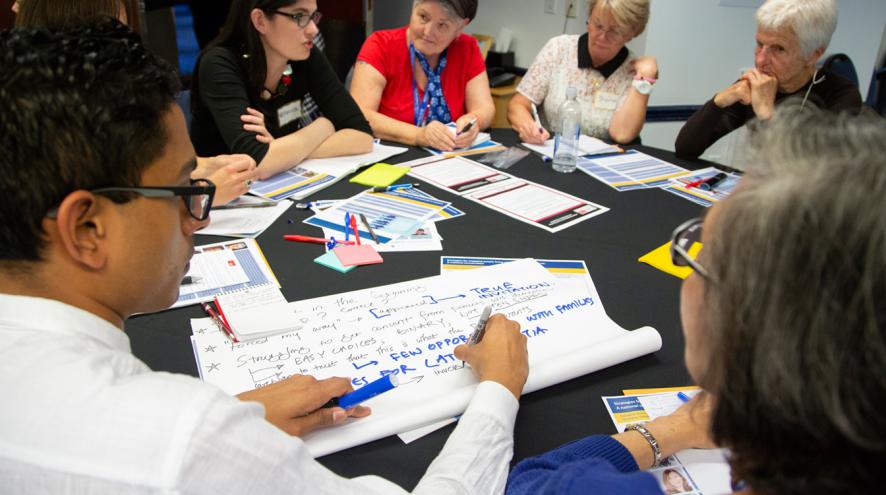Dementia-friendly research
Learn about patient-oriented research and dementia-friendly research and why they make a difference.

There is a cultural shift happening in health research. The research community is finding that health research is more successful when it is “patient-oriented” – when it focuses on, and is guided by, people with lived experience.
People living with dementia have historically been excluded from research and, despite the new surge in patient engagement in research, they are still largely excluded. The common belief that people living with dementia are unable to understand research processes and give proper consent is untrue. People living with dementia and their care partners are experts in the lived experience of dementia and can contribute greatly to research.
Dementia-friendly research
Dementia-friendly research is a model of research that meaningfully engages and partners with people living with dementia and their care partners as participants, co-researchers and advisors. The Society is committed to defining and promoting this model.
By embracing dementia-friendly research, we can create a dementia-friendly future. Research must be as effective as possible by acknowledging that people living with dementia and their care partners are essential to the research process. By supporting dementia-friendly research, we help ensure success and accelerate discovery.
What is dementia-friendly research?
Research is dementia-friendly when it:
- Meaningfully engages people affected by dementia before the study begins to develop research questions.
- Invites people with lived experience to take on advisory and co-researcher roles during the study.
- Commits to accessible knowledge mobilization after the study is completed.
To overcome barriers to dementia-friendly research, researchers must:
- Combat the stigma associated with dementia by examining their own beliefs and taking part in larger efforts, such as education sessions and awareness campaigns.
- Educate research ethics boards on the unique needs and abilities of people living with dementia.
- Create flexible research designs to meet the changing realities of people living with dementia and allow for their continued participation throughout the study. This includes using methods that don’t solely depend on written or verbal communication and scheduling activities around the person living with dementia.
Dementia-friendly research resources
The following resources were derived from a participatory research study that took place in collaboration with the Health Design Lab at Emily Carr University of Art + Design, the Alzheimer Society of B.C. and two researchers, Dr. Gloria Puurveen from the University of British Columbia and Dr. Jodie Gawryluk from University of Victoria. A group of interdisciplinary researchers, practitioners and people with lived experiences were invited to share their experiences.
Opening a Door to Collaborative Research: This brochure, created by people living with dementia for people living with dementia, emphasizes the importance of collaboration between researchers and people living with dementia.
Collaborate Gather Share: Researchers are continually developing practices that engage participants with lived experiences to participate in research and generate shared knowledge. This workbook brings attention to how research practitioners use these practices and highlights how people with lived experience can contribute to research beyond their role as participants.

Learn more
The Alzheimer Society of B.C. will continue to organize events around British Columbia that bring together researchers, people living with dementia, care partners, health leaders, students and other key stakeholders to further explore and define this concept.
Do you want to learn more about dementia-friendly research? Call 1-800-667-3742 or email research@alzheimerbc.org
